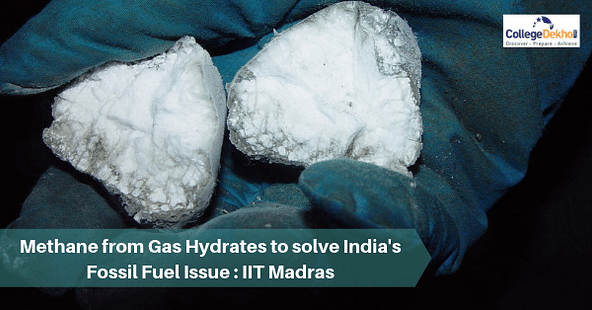To address the fossil fuel problem that is likely to emerge majorly in India, the IIT Madras researchers took up research on methane production from gas hydrates which possibly can eradicate India’s fossil fuel issue.

The Indian Institute of Technology - IIT Madras said that their researchers are working on developing a new technique which will be beneficial to extract Methane from the Natural Gas Hydrates. The officials of the Institute informed that the positive results have come up in the research and the same has been published in leading international scientific journals like Applied Energy and Energy & Fuels.
The IIT Madras has informed that ‘Gas Hydrates’ are the ice-like ‘crystalline caged’ form of Gasses. There is a worldwide interest now emerging to extract Methane from those Gas Hydrates. Methane is expected to be present in shallow sediments in Gas Hydrates along the continental coastlines.
IIT Madras said that inside the waters of the Indian Exclusive Economic Zone, there is an expected huge amount of methane present in untapped cages. The projected amount of methane that lie there is 1,900 trillion cubic meters. For this reason, the institute believes that the hydrates are a promising source of methane in India.
In a report by the Ministry of Earth Science, it is claimed that Andaman Nicobar Islands and Krishna-Godavari basins have a high amount of Gas Hydrates in store. The IIT Madras has said that the reserve of Methane is 1,500 times more than the natural gas reserves of the country.
The statement by IITM said that the research on extracting Methane from Gas hydrates can show positive results as it will complement the Natural Gas Fuel needs of the country and lessen the burden of Gas Imports on the government.
The researcher's group consists of professor Jitendra Sangwai who is the professor of Ocean Engineering and Petroleum Engineering and studies the state of the art techniques used to acquire crude oil from reservoirs located at offshore locations of India. The other IIT Madras research members are Vishnu C and Pawan Gupta.
The Departement of Science and Technology (DST) of Indian Institute of Technology - IIT Madras is currently funding the research.
As quoted in the statement, Mr. Sangwai has said that the researchers around the world are now trying to extract methane from Gas Hydrates which are stores in Sandy and Clayey reservoirs. Krishna Godavari basins are clayey reservoirs or Gas Hydrates while the Indian peninsular reservoirs are the mix of Sandy and Clayey Reservoirs.
He added that before the Methane Extraction, it is essentials to separate the gas from their constituent gas and water bodies as the gas reservoirs and immobile and impermeable.
Also Read: Jamia Researchers Develop a highly sensitive quantum thermometer
Depressurisation, Chemical Injection, Thermal Stimulation, and Carbon Dioxide Injection are the four processes that are being used to disassociate the gasses by various laboratories across the globe.
In one branch of study, The team led by Mr. Sangwai has been analysing the combined effect of depressurisation and thermal stimulation and in another branch, the team analysed the effect of Polymer Injection. The research results have reported positive outcomes of the combined method of depressurisation and thermal stimulation effective for the clayey conditions of Gas Hydrates for the production of Methane. In the second process, the researchers have reported that multiple-step depressurisation has been proved effective to produce methane than single step depressurisation.
The statement has expressed its optimism that multi-step depressurisation is the most cost-efficient process to produce methane from gas hydrates in clayey soil conditions. It predicts that this process is likely to receive more development in future.
Stay Tuned to CollegeDekho for more News and Updates.


 Follow us
Follow us













